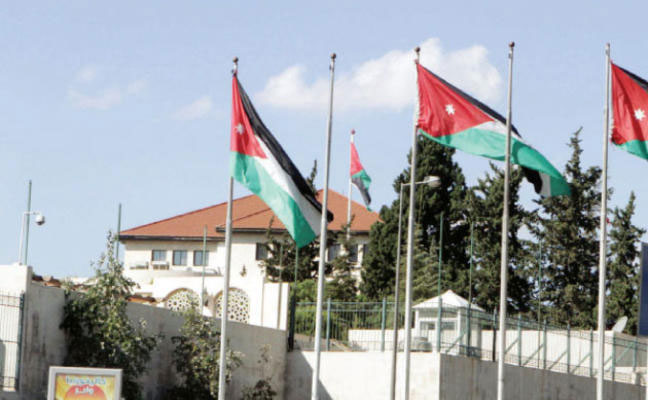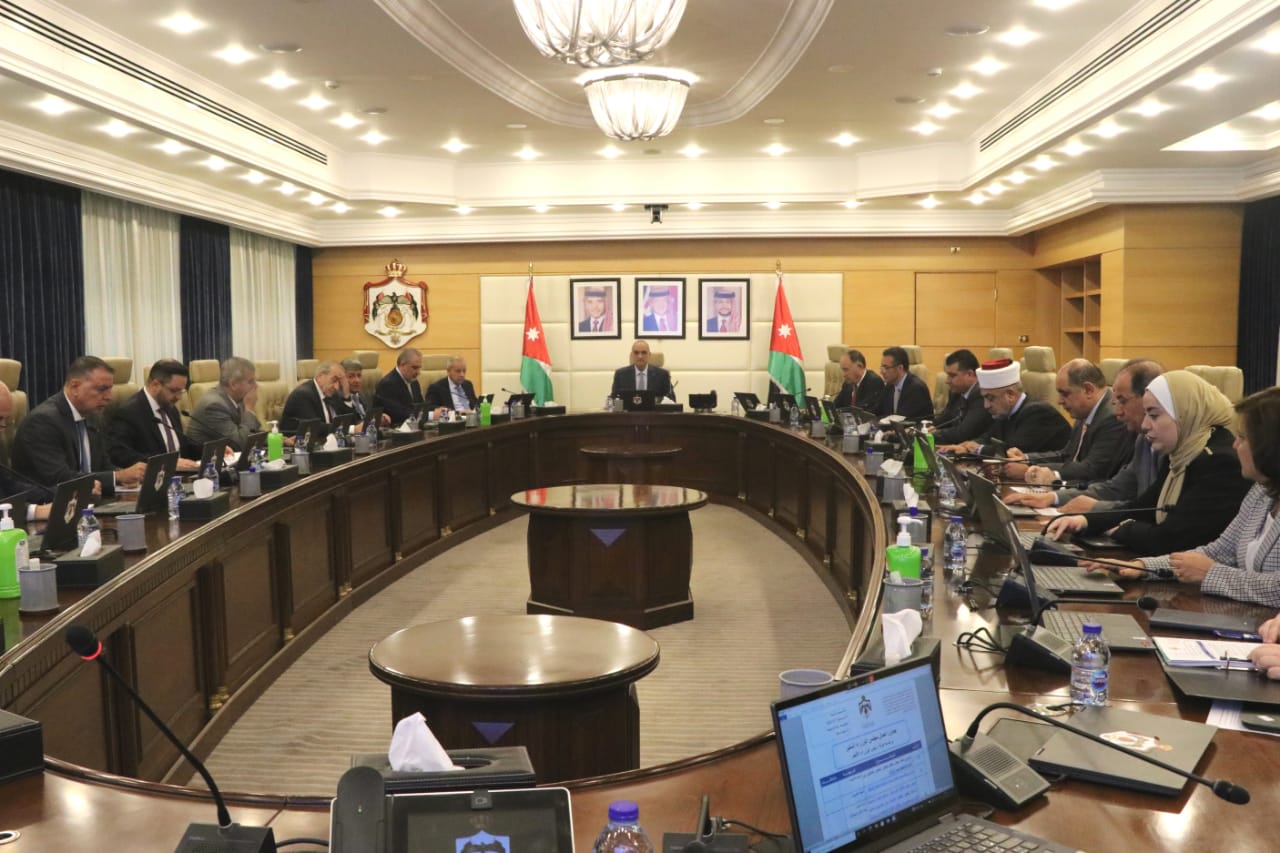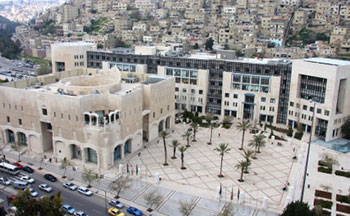 The Prime Ministry
The Prime Ministry
The Prime Ministry
Prime Minister

Prime Minister H.E. Dr. Jafar Hassan
Profile of Prime Minister- Dr. Jafar Hassan
Jafar Hassan (1968), a Jordanian politician and former minister, has served in several positions, including Minister of Planning and International Cooperation (2009-2013), Director of the Office of His Majesty King Abdullah II (2014 – 2018), and Deputy Prime Minister and Minister of State for Economic Affairs in 2018, before serving again as Director of the Office of His Majesty King Abdullah II (2021-2024). He is the author of a book printed in Arabic on Jordan’s political economy.
He received his education at the Bishop School in Amman, graduating in 1985, and pursued his higher education in France, Switzerland, and the United States, where he received his Bachelor’s, Master’s, and PhD degrees.
He is married, with three children.
Education
- PhD and DES in Political Sciences and International Economics from the Graduate Institute of International and Development Studies in Geneva, Switzerland.
- Master’s degree in Public Administration from Harvard University/Kennedy School of Government, the United States of America.
- Master’s degree in International Relations from Boston University, the United States of America.
- Bachelor’s degree in International Relations from the American University in Paris.
Career
- Attaché at the Ministry of Foreign Affairs (1991).
- Office of the Military Secretary of His Majesty, and Office of the Cultural Advisor of His Majesty, the Royal Hashemite Court (1993-1995).
- Jordan’s Permanent Mission to the United Nations in Geneva (1995-1999).
- State Security Council, the Royal Hashemite Court (1999-2001).
- Chargé d’affaires and Deputy Head of Mission at the Embassy of the Hashemite Kingdom of Jordan in Washington, DC (2001-2006).
- Director of the International Affairs Department at the Royal Hashemite Court, (2006-2009).
- Minister of Planning and International Cooperation (2009-2013) in the governments of Samir Rifai, Marouf Bakhit, Awn Al Khasawneh, Fayez Tarawneh, and Abdullah Ensour.
- As Jordan’s Minister of Planning and International Cooperation, he served as the Kingdom’s Governor at the World Bank, the Islamic Development Bank, and the European Bank for Reconstruction and Development.
- Director of the Office of His Majesty King Abdullah II (2014-2018).
- Deputy Prime Minister and Minister of State for Economic Affairs (February to June 2018) in the government of Hani Mulki.
- Director of the Office of His Majesty King Abdullah II (2021-2024).
Awards
- Order of the State Centennial (Jordan).
- Al Kawkab Order of the First Class (Jordan).
- Order of Al Istiqlal (Independence) of the Third Class (Jordan).
- Order of Merit - Grand Cross (Portugal).
- Order of the Crown Grand Cross (Belgium).
- Order of Merit of the Italian Republic (Italy).
- Order of the Rising Sun, Gold and Silver Star (Japan).
General Information
In August 1920, the British High Commissioner sent a number of British officials to Trans Jordan to help with the establishment of an emirate under the British mandate. Three autonomous governments were formed at that time; one in Ajloun, another in Amman and Salt and a third in Kerak. In June 1920, a number of Jordanian chieftains sent word to Sherif Hussein in Mecca asking him to send one of his sons to Jordan to head a movement for the liberation of Syria from the French rule. Sherif Hussein sent his son Prince Abdullah who arrived in Ma'an in November 1920.
Prince Abdullah proceeded to Amman and arrived on March 2nd, 1921. His arrival was a turning point in the history of Jordan, preventing Jordan’s inclusion in the Jewish scheme for a national homeland following the announcement of the Balfour Declaration in November 1917. Ever since the first Jordanian government was formed, Prince Abdullah was resolved that people elect their representatives in a legislative council that will aid the Prince in running the country. That was not to happen unless Britain acknowledged Jordan as an independent state.
Prince Abdullah resumed talks with the British to gain independence. Britain declared Trans Jordan an independent state on May 25, 1923, to be known from therein as Jordan's Independence Day.
Following Britain's declaration, and after he earned independence, Prince Abdullah embarked on his plans to develop the Emirate's institutional foundations. Following that, a decree was issued stating the formation of a civil committee of the country's leading men to formulate the law for electing a lower house of parliament based on solid political representation. A preliminary committee of men of scholars, leaders and legislators were appointed to formulate the first Fundamental Law (the Constitution). The history of the Emirate witnessed 18 cabinets, the first of which was formed on May 11, 1921 under Rashid Tlai. It wasn’t until May 25, 1946, that the negotiations to end the British mandate succeeded, and the Emirate was announced an independent state under the new name of the Hashemite Kingdom of Jordan.
H.E. Samir Rifai' formed the nineteenth cabinet on February 4th, 1947, to be the first cabinet in the reign of King Abdullah I Bin Al Hussein, the founder of the Kingdom who witnessed six cabinets in his time.
Tragically King Abdullah I was assassinated on June 20, 1951, and Prince Nayef Bin Abdullah was proclaimed regent during the absence of his brother Crown Prince Talal. The cabinet resigned on June 25, 1951.
On June 25, 1951 the first cabinet under Prince Nayef, the regent, was formed under Tawfiq Abul Huda who headed two more cabinets during the time of King Talal.
On August 11, 1952, the Parliament decided to end the rule of King Talal due to his illness, and Crown Prince Hussein Bin Talal was named King. The Council of Regents was called upon, as the new King could not assume his royal prerogative until he was eighteen. A cabinet during the time was formed on September 30, 1952.
King Hussein assumed his constitutional powers on August 11, 1952. The first cabinet during his reign was formed on May 5, with Fawzi Mulqi as Prime Minister. During his lifetime, and until the date of his passing away on February 7, 1999, the late King Hussein witnessed 57 cabinets.
King Abdullah II assumed his constitutional powers on February 7, 1999. The first cabinet was formed on February 16, 1999, headed by Abdul Ra'uf Rawabdeh as Prime Minister.
Contact Information
- Website
- http://www.pm.gov.jo
- Fax
- (962) 6 464 2520





